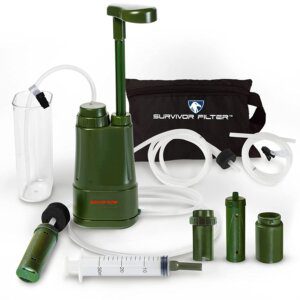The wilderness can be a beautiful and exciting place, but it can also be dangerous and unpredictable. Whether you’re an experienced outdoors person or a beginner, it’s important to know basic survival skills in case of an emergency.
In this blog post, we’ll explore some essential wilderness survival skills that can help you stay safe in the great outdoors.
Surviving in the Alaskan wilderness is an endeavor that demands respect for nature, self-reliance, and a comprehensive understanding of the unique challenges posed by this unforgiving environment. Whether you’re a seasoned outdoors enthusiast or a novice adventurer, navigating the Last Frontier requires a combination of knowledge, skill, and mental fortitude.
Understanding the environment is the first crucial step. Alaska’s climate is notorious for its extremes, ranging from bone-chilling winters with temperatures plunging far below freezing to relatively mild summers with extended daylight hours. Acquaint yourself with the geography, weather patterns, and the diverse wildlife that inhabits this vast landscape. Knowing the lay of the land will be instrumental in planning your survival strategy.
Invest in high-quality gear tailored for extreme conditions. From insulated clothing and waterproof layers to sturdy hiking boots and cold-weather sleeping bags, your equipment can make the difference between comfort and distress. A reliable multi-tool, a sturdy knife, and a waterproof fire starter are essential tools for your survival kit. Additionally, consider carrying a satellite phone or emergency beacon for communication in remote areas.
Building a shelter is a fundamental skill. In the Alaskan wilderness, where temperatures can plummet, knowing how to construct a shelter using natural materials like branches, leaves, and snow is imperative. A well-built shelter not only shields you from the elements but also helps retain precious body heat.
Firecraft is the heart of survival. Master the art of making fires under different conditions, including wet and windy weather. Pack waterproof matches, lighters, and fire-starting materials. A blazing fire not only provides warmth but also serves as a means to cook food, offering a psychological boost in challenging situations.
Water is your lifeline, so understanding how to source and purify it is critical. Identify safe water sources and invest in a reliable water purification system. Boiling water is a simple and effective method to eliminate harmful bacteria and parasites. Carry a portable water filter for on-the-go purification.
Navigating the vast Alaskan wilderness requires both traditional and modern skills. Acquire proficiency in using a map and compass, as well as GPS devices. While GPS is valuable, it can fail or run out of battery, emphasizing the importance of traditional navigation skills. Familiarize yourself with local landmarks and terrain features to avoid getting lost.
For sustenance, learn to forage for food. Identify edible plants such as berries and wild greens. Develop basic hunting and fishing skills, adhering to local regulations. Lightweight fishing gear and snares can serve as renewable sources of food, supplementing your supplies.
Wildlife encounters are inevitable, and knowing how to navigate them safely is crucial. Carry bear spray, understand its proper usage, and make noise to alert animals of your presence. Learn the habits and behaviors of local wildlife to minimize potentially dangerous situations.
Mental toughness is a silent ally in the wilderness. Develop a positive mindset, stay calm in stressful situations, and embrace the solitude that comes with remote living. Combat loneliness and isolation by engaging in activities like journaling or practicing mindfulness.
Shelter Building
Building a shelter is one of the most important skills you need to learn when you’re in the wilderness. It can protect you from the elements, help you stay warm, and keep you safe from animals. Look for natural materials like branches, leaves, and grass, or use a tarp or poncho if you have one.
Finding and Purifying Water
Water is essential for survival, and you need to know how to find it and make it safe to drink. Look for streams, lakes, and rivers, or collect rainwater. Use a filter, boiling, or chemical purification methods to make sure the water is safe to drink.
Fire Building
Fire can help keep you warm, dry your clothes, cook your food, and signal for help. It can also help keep animals away. Collect dry tinder, kindling, and firewood, and use a fire starter or matches to get the fire going.

Navigation
If you get lost in the wilderness, it’s important to know how to find your way back to civilization. Use a map and compass or GPS (such as a Garmin device like the Garmin Montana 700i) to navigate, and learn basic orienteering skills.
First Aid
Accidents can happen in the wilderness, and you need to know how to treat minor injuries and illnesses. Bring a first aid kit, and learn basic first aid skills, such as CPR, treating cuts and bruises, and managing hypothermia and heatstroke.
Food and Foraging
Knowing how to find and forage for food in the wilderness can be lifesaving. Look for edible plants, berries, nuts, and insects, or learn how to fish, hunt, or trap animals.
Signal for Help
If you’re lost or injured in the wilderness, it’s important to know how to signal for help. Use a whistle, a mirror, or a flare gun to signal for help. Build a signal fire, or create a large SOS sign on the ground with rocks or logs.
In conclusion, these are just a few essential wilderness survival skills that can help you stay safe and alive in the wilderness. Remember to always be prepared, bring the right gear, and stay calm in an emergency. With these skills and a bit of practice, you can explore the wilderness with confidence and peace of mind.
Lastly, emergency preparedness is paramount. Create a detailed plan and share it with someone who can alert authorities if needed. Pack a comprehensive first aid kit and ensure you have a thorough understanding of basic medical procedures.
Surviving in the Alaskan wilderness is not just about enduring; it’s about thriving. With the right mindset, skills, and preparation, you can forge a connection with this majestic landscape and emerge from the Last Frontier with an unforgettable experience.
disclaimer : this guide is for informational purposes only












